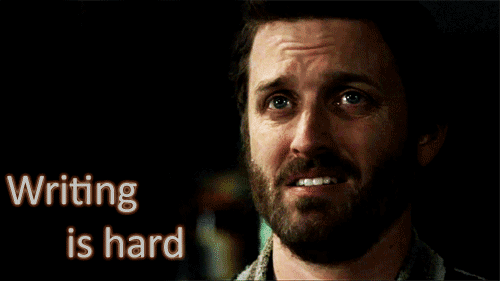#Point of View
Explore tagged Tumblr posts
Text
What to give a fuck about,while writing your first draft!
I`ve posted a list about things you don´t need to give a fuck about while writing your first draft. Here are things you NEED TO CARE about! (in my opinion)
Your Authentic Voice: Don't let the fear of judgment or comparison stifle your unique voice. I know it´s hard,but try to write from your heart, and don't worry about perfection in the first draft. Let your authenticity shine through your words.
Your Story, Your Way: It's your narrative, your world, and your characters. Don't let external expectations or trends dictate how your story should unfold. Write the story you want to tell.
Progress Over Perfection: Your first draft is not the final product; it's the raw material for your masterpiece. Give a fuck about making progress, not achieving perfection. Embrace imperfections and understand that editing comes later.
Consistency and Routine: Discipline matters. Make a commitment to your writing routine and stick to it.
Feedback and Growth: While it's essential to protect your creative space during the first draft, be open to constructive feedback later on. Giving a f*ck about growth means you're willing to learn from others and improve your work.
Self-Compassion: Mistakes, writer's block, and self-doubt are all part of the process. Give a f*ck about being kind to yourself. Don't beat yourself up if the words don't flow perfectly every time. Keep pushing forward and remember that writing is a journey.
Remember, the first draft is your canvas, your playground. Don't bog yourself down with unnecessary worries.

#writing#writblr#writing advice#writers block#just writer things#creative writing#fanfiction writing#writing motivation#writeblr#original writing#writing reference#writing tips#writers on tumblr#writing resources#writing tip#writing encouragement#writing community#writers#world building#point of view#editing#character creation#dialogue#mine.#words#writingtips#writingadvice
5K notes
·
View notes
Text
5 Reasons NOT to Use Multiple Point of View (and What to Do Instead)
I've been meaning to make this post for a long time. As a developmental editor, I see a LOT of manuscripts that use multiple point of view (where each scene or chapter is from the perspective of a different character), when they really should be using a classic single character POV. Over the years, I've come to the conclusion that writers see multiple POV as a solution to problems that really shouldn't be solved that way. Basically, they're using it for the wrong reasons. And when that happens, instead of making the story more awesome, multiple POV can actually weaken it.
Here are five of the most common reasons writers choose multiple POV (and why those reasons might be a problem). Don’t worry—I’ll also share what to do instead.
1. You Don’t Know What Your Story Is About
Sometimes, when writers aren’t 100% clear on their story’s main conflict, theme, or plot, they reach for multiple POV. It feels like a fix—after all, why focus on one perspective when you can try out a little of this and a little of that?
Here’s the thing: multiple POV actually requires you to be more clear about your story, not less. Readers will naturally look for a thread that ties all the perspectives together, and if that thread isn’t there, the story will feel scattered or aimless.
What to Do Instead: Take a step back. If you’re feeling unsure about what your story is really about, try some journaling or outlining. Ask yourself:
What’s the main conflict?
Who’s the central character?
Why am I telling this story?
Often, writers discover they actually have one protagonist, and a limited third or first-person perspective would work better. If you still feel like multiple POV is the right call, go for it! Just be sure to periodically revisit your outline to make sure the story hasn’t “gotten away” from you. (Multiple POV has a sneaky way of doing that.)
2. You Haven’t Developed Your Characters
Multiple POV doesn’t work unless each character is fully developed. Every POV character needs their own voice, journey, and reason for being in the story. If they can’t stand on their own, readers will notice.
What to Do Instead: Before assigning a POV, ask yourself:
Is this character compelling enough to hold the reader’s attention?
Do they add something essential to the story that no one else can?
If the answer is no, it might be better to stick with a single POV. Sometimes less is more.
3. You Can’t Decide on a POV Character
This one is common, especially in early drafts. You’re still figuring out your story, and it’s hard to choose whose perspective should take center stage.
What to Do Instead: Experiment! Write key scenes from different characters’ perspectives. Often, the strongest voice will make itself known as you go. And remember: just because you write a draft with multiple POV doesn’t mean you can’t narrow it down later.
4. You Need to Share Information Your POV Character Doesn’t Have
Ah, the classic "But how do I show this thing the protagonist doesn’t know?" dilemma. This is probably the most common reason I see writers reach for multiple POV. It’s tempting to throw in a chapter or two from another character’s perspective just to share that extra bit of information.
The problem? Those chapters often feel disconnected from the rest of the story. Every POV character needs to carry their weight, and dropping in a random narrator just for convenience can leave readers feeling unsatisfied.
What to Do Instead: There are other ways to get information across. Here are a few ideas:
Educated Guesses: Let your main character speculate. (“Iris kept tapping her pencil on the desk. Was she nervous about the meeting earlier?”)
Show, Don’t Tell: Use actions, dialogue, or other clues to reveal what another character might be thinking.
Bring in a New Element: Introduce a third character, a conflict, or even an object that reveals something important.
Overhearing or Spying: Yes, it’s a little cliché, but when used sparingly, it can work in a pinch.
5. You’re Looking for an Easy Way Out
Let’s be honest: multiple POV can feel like a catch-all solution to tough storytelling problems. Need to fix pacing? Add another POV! Can’t figure out how to make the ending work? Add another POV!
But here’s the truth: multiple POV is actually harder than other POVs. You’re not just developing one character—you’re developing several, and you have to tie all their perspectives into a cohesive whole.
What to Do Instead: Focus on nailing the story with a single POV first. Once you’re confident the core of the story is solid, you can decide if adding other perspectives will truly enhance it.
In Summary
Multiple POV is a powerful tool, but it’s not a shortcut. It requires careful planning and strong execution. If you’re considering it, ask yourself:
Does every POV character bring something unique to the story?
Am I clear on the main conflict and theme?
Could this story be told just as well (or better) with a single POV?
Sometimes, the simplest route is the best one.
Hope this helps!
/ / / / / / / / / / /
@theliteraryarchitect is a writing advice blog run by me, Bucket Siler, a writer and developmental editor. For more writing help, download my Free Resource Library for Fiction Writers, join my email list, or check out my book The Complete Guide to Self-Editing for Fiction Writers.
#writeblr#writing advice#writers on tumblr#editing#writing tips#fiction#nanowrimo#point of view#multiple point of view#op
430 notes
·
View notes
Text
Something I really like about Page is that at the midwinter feast we have "Daine the Wildmage and her lover Numair".
Not The Super Powerful Mage Numair and Daine.
Not the mage Numair and his lover Daine.
Not even Numair and his lover Daine the wildmage.
Daine is Kel's friend (Numair is just this guy who made them freeze on the middle of a fight and wandered off, needing to be reminded to unfreeze them), so we see it from Kel's perspective as Daine The Amazing plus her sidekick.
#tamora pierce#daine#daine the wildmage#numair salmalin#keladry of mindelan#page#midwinter#midwinter feast#bookaholic#book#stories#tortall#point of view#the woman and her man
273 notes
·
View notes
Text

#love#positive#motivation#strong#positive life#positive mental attitude#get motivated#mindfulness#point of view#words#reality#poetry
2K notes
·
View notes
Text
@oifaaa
132 notes
·
View notes
Text
Different POVs In Writing
POV - Short for Point Of View, meaning that the audience is experiencing a story from the perspective of a specific person or outside entity; they are part of the story in one way or another
• 1st Person POV - Experiencing a story from the perspective of the main character. Pronouns will be I, me, my, mine, etc
• 2nd Person POV - Experiencing a story from your own perspective as if you were a character within the story. Pronouns will be you, your, yours, etc. Stories are rarely written from this perspective outside of Choose Your Own Adventure style stories
• 3rd Person POV - Experiencing a story from an outside perspective. No personal pronouns will be used for you, but other characters will be referred to as he, she, they, it, etc
• 4th Person POV - Experiencing a story through a collective perspective. Pronouns include we, us, someone, anyone, etc. I’ve never seen a story written from this perspective. Fourth person perspective is mostly used in livestreams, in which the chat forms a non-specific collective presence that are all addressed as one
#pov#point of view#writing#writers#writeblr#bookblr#book#writers on tumblr#writerscommunity#writers of tumblr#writer#on writing#creative writing#write#writblr#female writers#queer writers#writer things#writer stuff#writers and poets#writing life#original writing#writer problems#writerscreed#writerblr#writersociety#writersnetwork#writerslife#writerscorner#writing prompt
959 notes
·
View notes
Text

𝐁𝐫𝐢𝐭𝐭𝐚𝐧𝐲𝐚 𝐑𝐚𝐳𝐚𝐯𝐢
470 notes
·
View notes
Text
Writing Notes: First Person Point of View

In writing, the first person point of view - uses the pronouns “I,” “me,” “we,” and “us,” in order to tell a story from the narrator’s perspective.
The storyteller in a first-person narrative is either the protagonist relaying their experiences or a peripheral character telling the protagonist’s story.
Tips For Writing in First Person
Once you’ve decided to write your story in the first person, use these tips to guide your narrative voice.
Write an opening like Melville. Let the reader know you’re using a first-person perspective right away as Melville did in the opening line of Moby Dick with “Call me Ishmael.” Introduce the character and narrative voice within the first two paragraphs to create a bond with your readers from the start.
Be descriptive. In the first person, avoid phrases that keep the reader in the narrator’s brain—for example, “I thought,” or “I felt.” While one of the advantages of first person is to know what the narrator is thinking, don’t get stuck in their head. We also want to see through their eyes so use visual language to show the reader around their world.
Stay in character. When using the pronoun “I,” it’s easy to slip out of your character’s voice and into your own as the author. When you’re writing, stay true to your narrator’s perspective.
Mix it up. Starting every line with “I” can become repetitive; vary your sentences by illustrating thoughts or feelings. Instead of writing “I felt tired walking through the deep snow”, try “the mountain was buried in snow, making every step feel like a mile.”
Create a strong narrator. Make your first-person narrator an interesting character to make the story really work. Give them a solid backstory that influences their perspective.
Reasons to Write in First Person Point of View
When you’re writing a story, you have several narrative voices to choose from. Giving the protagonist or someone close to them the narrative reins has its advantages. A first-person narrator gives the reader a front row seat to the story. It also:
Gives a story credibility. First-person point of view builds a rapport with readers by sharing a personal story directly with them. Bringing the reader in close like this makes a story—and storyteller—credible. From the opening line of Herman Melville’s epic sea tale, Moby Dick, the reader is on a first-name basis with the narrator: “Call me Ishmael.” This familiarity creates a relationship with the narrator, leading the readers to believe that what they are about to hear is a true story. When a writer breaks that narrative trust by leading readers astray—either through a narrator who deliberately lies or a characteristic of the narrator that compromises their credibility—the narrator becomes unreliable.
Expresses an opinion. A narrator tells a story through a lens filtered by their opinions. In the first person point of view, the use of the pronoun “I” establishes a sense of familiarity between reader and narrator, allowing the writer to subtly influence the reader by telling a story with a bias. Scout is the six-year-old narrator in To Kill A Mockingbird and the story is told with the innocence and naiveté of a child’s world view. The author, Harper Lee, had several characters to choose from, but telling this story about race in the American South through this young character’s eyes forces the reader to examine and question the inequalities of race in the same way that Scout does.
Builds intrigue. First person perspective limits a reader’s access to information. They only know and experience what the narrator does. This is an effective tool for creating suspense and building intrigue in stories, particularly in thrillers or mysteries. For example, John Watson is the narrator In almost all of Sir Arthur Conan Doyle’s Sherlock Holmes mysteries. Keeping Holmes, the protagonist, at arm’s length makes him more interesting, but it also allows the reader to be just as surprised as Watson when Holmes finally cracks a case. Readers tend to identify with characters who are learning like they are.
The role the narrator plays in a story determines the type of first-person point of view. The elements of a story—like genre—can help determine who is best suited to serve as narrator and which first-person voice to use.
First-person central. In first-person central, the narrator is also the protagonist at the heart of the plot. Margaret Atwood’s novel Alias Grace employs first-person central point of view. The story is based on a historical event: a double murder that occurred in 1843 in which a manservant was tried and hanged for the murder of his employer. Grace Marks, a maid, was tried and imprisoned as his accessory. The novel is told in through Grace’s point of view as she speaks to the doctor hired to exonerate her.
First-person peripheral. In first-person peripheral, the narrator is a witness to the story but she or he is not the main character. In The Great Gatsby, F. Scott Fitzgerald created the character of Nick, a friend of the protagonist, Jay Gatsby. Nick tells the story of Gatsby trying to win the love of Nick’s cousin, Daisy. Telling the story this way keeps the focus on the protagonist but also creates some distance, so the reader is not privy to their thoughts or feelings. This deliberately keeps Gatsby as a mysterious character and enables Nick to tell the story with a slant, drawing on his experience with Gatsby and his opinion of him to color the narration.
Source ⚜ More: Notes & References ⚜ Writing Resources PDFs
#point of view#writing tips#writeblr#literature#writers on tumblr#writing reference#spilled ink#dark academia#writing prompt#creative writing#writing advice#on writing#writing inspiration#writing ideas#books#bookblr#character development#booklr#light academia#writing resources
135 notes
·
View notes
Text
La frase di Trump "tutti verranno da me a baciarmi il culo" è sguaiata, inelegante, infelice.
Di fatto però ha semplicemente esplicitato quello che effettivamente tutti fanno verso gli USA e che fino a ieri facevano nei confronti di Biden.
Stessa sostanza, etichetta differente.
83 notes
·
View notes
Text
Creative misfortunes for characters
Identity Crisis: Have your character lose their memory, forcing them to rediscover their true self and past.
Betrayal by a Loved One: A close friend or family member betrays the character's trust, leading to emotional turmoil and inner conflict.
Physical Transformation: Give your character a physical ailment or transformation that they must come to terms with, such as sudden blindness, a debilitating illness, or turning into a different species.
Unrequited Love: Make your character fall deeply in love with someone who doesn't reciprocate their feelings, causing heartache and a quest for self-discovery.
Financial Ruin: Strip your character of their wealth and privilege, forcing them to adapt to a life of poverty and face the harsh realities of the world.
False Accusation: Have your character falsely accused of a crime they didn't commit, leading to a desperate quest to clear their name.
Natural Disaster: Place your character in the path of a devastating natural disaster, such as a hurricane, earthquake, or tsunami, and force them to survive and rebuild.
Loss of a Sense: Take away one of your character's senses (e.g., sight, hearing, taste) and explore how they adapt and cope with this profound change.
Forced Isolation: Trap your character in a remote location, like a deserted island, and make them confront their inner demons while struggling to survive.
Haunted Past: Reveal a dark secret from your character's past that comes back to haunt them, threatening their relationships and well-being.
Time Travel Consequences: Send your character back in time, but make them inadvertently change a crucial event in history, leading to unintended consequences in the present.
Psychological Breakdown: Push your character to the brink of a mental breakdown, exploring the complexities of their psyche and their journey towards recovery.
Unwanted Prophecy: Have your character be the subject of a prophecy they want no part of, as it places them in grave danger or disrupts their life.
Loss of a Loved One: Kill off a beloved character or make your protagonist witness the death of someone close to them, igniting a quest for revenge or justice.
Incurable Curse or Disease: Curse your character with an incurable ailment or supernatural curse, and follow their journey to find a cure or accept their fate.
Sudden Disappearance: Make a character disappear mysteriously, leaving the others to search for them and uncover the truth.
Betrayal of Morals: Force your character into a situation where they must compromise their ethical values for a greater cause, leading to moral dilemmas and internal conflict.
Loss of a Precious Object: Have your character lose a cherished possession or artifact that holds sentimental or magical significance, setting them on a quest to recover it.
Political Intrigue: Place your character in a position of power or influence, then subject them to political intrigue, manipulation, and power struggles.
Existential Crisis: Make your character question the meaning of life, their purpose, and their place in the universe, leading to a philosophical journey of self-discovery.
Remember that misfortunes should serve a purpose in your story, driving character growth, plot development, and thematic exploration.

#writing#writing advice#writers block#just writer things#creative writing#fanfiction writing#writing motivation#writeblr#original writing#writing reference#writing tips#writers on tumblr#writing resources#writing tip#writing encouragement#writblr#writing community#writers#world building#point of view#editing#character creation#dialogue#mine.#words
3K notes
·
View notes
Text
In case anyone still needs them, here are the new unreleased 2003 Taylor Swift songs that just surfaced. Genius and other lyric sites aren't allowing the lyrics to be uploaded yet, so I included lyrics too.
Same Girl (previously leaked)
Baby Blue (not previously leaked)
Never Fade (previously leaked)
Fire (not previously leaked)
Mary Jo (not previously leaked)
My Turn To Be Me (previously leaked)
Kid In The Crowd (not previously leaked)
I Used To Fly (previously leaked)
Lucky You - acoustic version (not previously available)
Point Of View (previously leaked)
Why Do You Tell Me? (not previously leaked)
Houston Rodeo (not previously leaked)
A Little More Like You (not previously leaked)
One-Sided Goodbye (not previously leaked)
Ride On (not previously leaked)
Smokey Black Nights - acoustic version (not previously available)
Half-Way To Texas (not previously leaked)
Beautiful Days (not previously leaked)
Your Heart's Somewhere Else (not previously leaked)
Lucky You - Mix (previously leaked)
Smokey Black Nights - Mix (previously leaked)
#taylor swift#taylor swift unreleased#same girl#baby blue#never fade#fire#mary jo#my turn to be me#kid in the crowd#i used to fly#lucky you#lucky you acoustic#point of view#why do you tell me#houston rodeo#a little more like you#one sided goodbye#ride on#smokey black nights#smokey black nights acoustic#halfway to texas#beautiful days#your heart's somewhere else#lucky you mix#smokey black nights mix
1K notes
·
View notes
Text


︶ㅤ✴*️ 김제니 ₊˚⊹˚ ⠀⠀⠀⠀⠀⠀⠀⠀i'd love to see me
⠀⠀⠀⠀⠀⠀⠀⠀⠀⠀⠀⠀⠀ from your point of view. . ˚₊‧ . ༄࿔ ❀




#GIF BY ME#moodboard#pink layout#silver and pink layout#jennie#div from v6que#mantra#jennie comeback#jennie layout#jennie moodboard#aesthetic#ig layout#fakeland layout#silver#pink#gray#white#lace divider#ariana grande#ariana grande pov#point of view#tv icons#gradient icons#jennie gif icons#gif icons#gifs#kpop moodboard#kpop layout#kpop#blackpink
226 notes
·
View notes
Text
Lamborghini aventador svj 👌
#luxury car exótico lamborghini aventador original post point of view beutiful fotografia videography cars carstagram#luxury car#exótico#lamborghini#videography#automoviles#cars#autos#view#bugatti#koenigsegg#luxury#carstagram#lamborgini aventador#lamborgini urus#car exporter#ferrari#luxurious#viralpost#point of view#aston martin#maserati#bugatti veyron#rolls royce
617 notes
·
View notes

